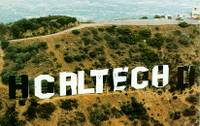April 08, 2007
Science and Belief, Not Incompatible
As you all know, I am a scientist. Most of my friends are scientists, my colleagues are scientists, and I have had the privilege of meeting many of the world's deepest and most renowned scientific thinkers.
And again and again, I am struck by the depth of faith to be found in the scientific community. While laypeople bitch and moan over Evolution, Creation, and Intelligent Design, many scientists simply don't see the incongruity.
The more you know about the amazing intricacies of the world around us, the easier it is to believe in an omniscient supreme being as designer and creator. It's all just so smart you know?
Anyway, the point of this post is to share with you a bit of this piece from CNN, where Dr. Francis Collins, Director of the Human Genome Project at NIH, discusses his faith and how one can be a scientist AND a believer.
So, some have asked, doesn't your brain explode? Can you both pursue an understanding of how life works using the tools of genetics and molecular biology, and worship a creator God? Aren't evolution and faith in God incompatible? Can a scientist believe in miracles like the resurrection?That's absolutely how I feel, and I know many others who feel the same way. Science and Faith go hand in hand. Science is the discovery of the majesty of our world, and revealing the wonder of the universe gives glory to its author.Actually, I find no conflict here, and neither apparently do the 40 percent of working scientists who claim to be believers. Yes, evolution by descent from a common ancestor is clearly true. If there was any lingering doubt about the evidence from the fossil record, the study of DNA provides the strongest possible proof of our relatedness to all other living things.
But why couldn't this be God's plan for creation? True, this is incompatible with an ultra-literal interpretation of Genesis, but long before Darwin, there were many thoughtful interpreters like St. Augustine, who found it impossible to be exactly sure what the meaning of that amazing creation story was supposed to be. So attaching oneself to such literal interpretations in the face of compelling scientific evidence pointing to the ancient age of Earth and the relatedness of living things by evolution seems neither wise nor necessary for the believer.
I have found there is a wonderful harmony in the complementary truths of science and faith. The God of the Bible is also the God of the genome. God can be found in the cathedral or in the laboratory. By investigating God's majestic and awesome creation, science can actually be a means of worship.
Have a Blessed Easter, Passover, or whatever you choose to celebrate this weekend!
h/t John at Wait 'til Next Year
Posted by caltechgirl at April 8, 2007 10:43 AM | TrackBackHappy Easter.
Posted by: vw bug at April 8, 2007 12:45 PMHappy Easter, CTG.
Posted by: Marie at April 8, 2007 01:59 PMGod is in the details... It all works for me! Happy Easter!
Posted by: Richmond at April 8, 2007 05:04 PMWELL SAID!!
Posted by: Marianne at April 8, 2007 09:01 PMI want to thank you for your thoughtful comments here. Having attended the most prestigious institutions for my undergrad and medical school, and having read works of the great current scientists, cosmologists, molecular biologists, quantum physicists, I have concluded everything you have stated. The historic person of Jesus Christ could have performed miracles, could be a visible part of the whole trinity (think the sphere which intersected the plane in Abbott's Flatland - was Christ the circle? Was the Father the part of the sphere above the plane? Was the Holy Spirit the part below the plane?) and, most importantly, have risen from the dead and appear to hundreds of eyewitnesses, could have been there in the beginning, etc. if there are more dimensions than our 3 (4), up to 11 as proposed by Witten's M-theory? Good enough for me. The acceptance of these other dimensions releases us from the need to "see", "touch", or experiment upon God. There are extra-dimensional entities to which our scientific method just can't apply (gasp!), and we have appreciated this fact as we reach the limits of our abilities to explore (think proving the Uncertainty Principle, how a deterministic model of the universe in which entropy is becoming maximal can't explain how in our corner the complexity of life is incredible!). Thanks again, and I look forward to reading other comments!!
Posted by: turbostar at April 8, 2007 10:58 PMThank you. Thank you. Caltechgirl, I only wish that I could have written that blog post. Very well put.
And Dr. Collins is 100% spot on about Augustine. One need only read the last several books of Augustine's Confessions, his search for God in the categories of memory, time and eternity, form and matter, and creation.
From a somewhat different angle, Thomas Aquinas also concluded that language regarding creation is analogical language— remember Aquinas and the analogia entis, the analogy of being, which is referential, but neither literal nor figurative nor any combination of literal and figurative.
I take a special interest in these matters, since before I became a Presbyterian minister, I was originally aimed to become a mathematician.
BTW, a belated Happy Easter!
And in math, most of my friends and colleagues were in math, physics, or engineering. Amazing how many of them, I remember, saw the matter in much the same light as you lay out here.
BTW, I managed to comment this time without acquiring a new blog. You may recall, attempting to comment on one of your posts about faith and science was how I originally (and rather accidentally) acquired a blog of my own, way back when... :-)
Heck, I'm an atheist, and I've long believed the same thing (about the compatibility of science and belief in God, that is).
(It helps having been raised as a non-believer, I think, rather than the god-hating types who were brought up as believers and then had to go to extremes as a form of rejection.
I have no dog in the fight, so I don't have any emotional investment.)
Posted by: Sigivald at April 9, 2007 03:58 PMYeah, personally I'm agnostic, but I never understood the argument that it was either one or the either. It always seemed very apples and oranges to me.
Posted by: silvermine at April 9, 2007 07:10 PMExcellent post-- reminds me of the einstein quote:
"Buddhism has the characteristics of what would be expected in a cosmic religion for the future: It transcends a personal God, avoids dogmas and theology; it covers both the natural and spritual; and it is based on a religious sense aspiring from the experience of all things, natural and spiritual, as a meaningful unity. -Albert Einstein
I've often told my daughters that chemistry is the study of things; biology is the study of life; and physics is the study of God.
Well, of course Dr. Collins is dead on. He articulates it so much better than I can though. Thanks for posting it, I hadn't seen it.
Posted by: Teresa at April 10, 2007 07:27 PMI'm still playing catch up on my blog reading... :)
I LOVE this post and will have my husband, the atheist, read it. For some reason he sees a disparity between science and faith. Not being a person of science, I've never had that particular problem. ;)
Thank you for posting this!!
Posted by: pam at April 11, 2007 06:20 AMI've always felt like you but couldn't have expressed it the way you did. Thank you!
(Faith and reason are like a pair of shoes...you can get a lot further with both than with just one or the other.)
Posted by: Mrs. Who at April 11, 2007 03:22 PMYou have no idea how long I've wanted to write this post myself.
Of course, there are those who believe in a literal interpretation of the bible. They're nearly unreachable, of course. I've tried to question these types on the editorial process.
It seems to me that unless a bible turns up, written in flaming letters, it was written by a human. There's bound to be interpretation in there somewhere.
Posted by: Aaron at April 13, 2007 08:59 PM














